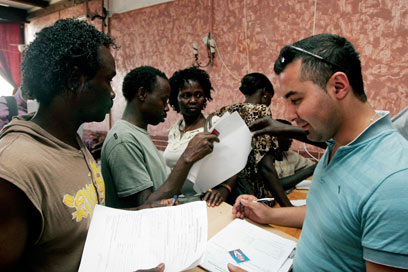Population and Immigration Authority's campaign to arrest illegal aliens reaches cities of Beersheba, Arad; officials say dozens signed voluntary departure forms. South Sudanese migrant: 'They fired everyone. We are left with no choice' Ilana Curiel
More than 80 foreigners illegally residing in Israel, including 70 South Sudanese citizens, wee arrested Monday as part of anextensive campaign to deport illegal aliens, which was launched by the Population and Immigration Authority. The men arrested during the operation were sent to Ktziot Prison, while women and children were transferred to the nearby Saharonim facility, ahead of deportation. Six families that were arrested but agreed to leave voluntarily were released until their scheduled flights. Related stories:
Interior Minister Eli Yishai told Ynet, "What we witnessed today was just the beginning of the battle for the future of Israel. I'm certain that the court will also sanction the deportation of infiltrators from Eritrea and Sudan, who pose the main threat." The Immigration Authority said the operation to arrest the 1,500 South Sudanese migrants will continue in the coming weeks. Some 60,000 illegal immigrants currently reside in Israel, including 35,000 Eritreans and 15,000 Sudanese nationals. Earlier, Yishai said the campaign "is not aimed against infiltrators, but instead is meant to preserve Israel's character as a Zionist-Jewish country." Meanwhile, officials from the Authority's enforcement unit arrived in the cities of Arad and Beersheba on Monday and distributed voluntary departure forms to South Sudanese citizens living in the area. Dozens have reportedly signed the forms thus far.  Migrants signing voluntary departure forms (Photo: Eliad Levy) However, community leaders say the migrants are not keen on going back to their homeland, but are forced to do so due to the harsh reality. "They fired all the people, so they decided to leave," said Michael Bazia, 45, a Sudanese community leader in Arad. "They treat us like animals so we have no choice but to go back," he lamented. Bazia expressed frustration over the Authority's decision to launch the campaign four days after the Administrative Court in Jerusalem gave the green light to deport South Sudanese citizens. "They said they would give us a week to prepare, but the week hasn’t ended yet and they already started with the arrests. "They are going from house to house and rounding up people. They tell us: 'Get your things and go,'" he said, adding that "the (people) are willing to go home, but not in this manner. We are tired of this. We've only had independence for 10 months. You can't build a state in 10 months."  Voluntary departure form. 'Ask me in S. Sudan' (Photo: Ilana Curiel) An official at the Population and Immigration Authority claimed that "whoever wants to leave voluntarily can receive a grant and some time to sort their affairs in Israel; this is much more respectful; each person should decide according to their own considerations." One South Sudanese resident who signed the voluntary departure forms told Ynet that he was given a week to leave the country. "I need to write down who will receive me in South Sudan, but I left my family in 1982 and I don't know what has happened to them since. I have been in Israel for four years, and I never thought such a thing would happen. People are unhappy; they want to work. I don't know where I'll go in South Sudan." Charlie Simon, also from South Sudan, said he was unable to answer all the questions on the form. "Future plans upon arrival? I can't answer that question. I don't know what is happening in that country, so I wrote 'ask me in South Sudan'." Eritrea has been recognized by the United Nations and the international community as a country ruled by a tyrannical regime that systematically violates human rights. Sudan, on the other hand, has no diplomatic relations with Israel and is defined as an "enemy state." Israeli efforts to deport Sudanese and Eritrean citizens to other countries have been unsuccessful thus far. | |||||||
Tuesday, June 12, 2012
Non Jewish Black refugees 'treated like animals' - Israel News, Ynetnews
Subscribe to:
Post Comments (Atom)

No comments:
Post a Comment